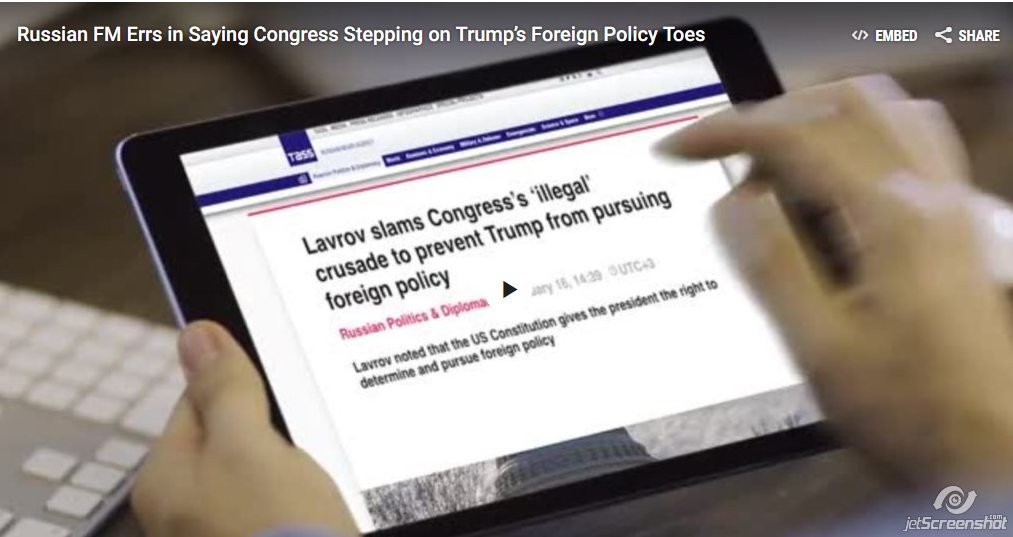“We do know that [the president’s right to determine and pursue foreign policy] has been coming under attack from the Congress. The issue is covered extensively. However, this does not make these attacks constitutional, and it does not make them less illegal either.”
FALSE
There has been no congressional overreach in current foreign policy.
During a Monday, January 16 press conference, CBS News Correspondent Elizabeth Palmer asked Russian Foreign Minister Sergei Lavrov if the Kremlin would share the content of meetings between U.S. President Donald Trump and Russian President Vladimir Putin in the “interest of transparency.”
Palmer’s question followed a Washington Post report that Trump had taken his interpreter’s notes after a meeting with Putin at the 2017 Group of 20 summit in Hamburg, Germany, allegedly asking the interpreter not to discuss the talks with anyone.
Lavrov said that was difficult to comment on what is going on in the United States in regards to accusations that President Trump is “a Russian agent,” saying the story reflects “a decline in journalistic standards.”
“I cannot believe that journalists in the United States pursue these issues sincerely and professionally,” Lavrov said.
Unprompted, Lavrov then continued to comment on what he described as efforts by the U.S. Congress to undermine the U.S. president’s right to determine and pursue his own foreign policy.
“We do know that this right has been coming under attack from Congress,” he said. “The issue is covered extensively. However, this does not make these attacks constitutional, and it does not make them less illegal either. I will not comment on the administration’s actions with regard to the powers the president and the administration have.”
We put the question of whether the U.S. Congress has acted unconstitutionally and unlawfully to prevent President Trump from pursuing his own foreign policy to several constitutional scholars.
Mark Graber, an expert on constitutional law and politics at the University of Maryland’s Carey School of Law, told Polygraph.info that while the U.S. president has distinct foreign policy powers, congressional actions have not been “interfering with the president’s core powers.”
“The president has a core power to be commander in chief. Congress cannot tell him to adopt a military strategy,” Graber said. “The main presidential powers [in foreign policy] deal with negotiating treaties and appointing ambassadors. Nothing congress has done has interfered with that.”
Robert Tsai, a law professor at American University, told Polygraph.info the original design of the U.S. Constitution “envisioned shared responsibility by the president and Congress.”
“[The framers of the constitution] wanted to make it harder, for instance, for the country to get entangled militarily in another country by requiring congressional approval for war,” he said. “And the power of the purse encompasses the ability to help set foreign policy by choosing to fund or defund foreign policy initiatives (for example, when Congress enacted the Boland Amendment to stop [President Ronald] Reagan from helping the Contras in Nicaragua, eventually leading to the Iran/Contra scandal),” Tsai said.
Both Tsai and Graber noted that Congress, rather than overstepping their constitutional bounds in the foreign policy arena, have arguably done the opposite.
Graber said he, in fact, had seen “congressional under-reach”.
Tsai argued that “congressional passivity … has allowed presidents to assert more power,” with some academics and lawyers arguing that the president should be granted “inherent powers to unilaterally control parts of foreign policy.”
Tsai said these defenders of a “unitary executive” theory are attempting to push the role of Commander in Chief “as far as it can go,” adding that “most people think this is a dangerous departure from the text and original design of the U.S. Constitution.”











